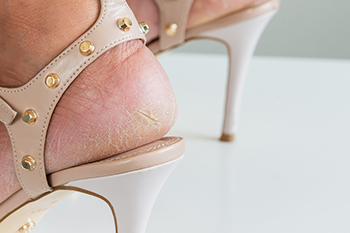Blog
Good Foot Care Habits Are Crucial for Seniors

Many elderly people who have chronic foot pain assume it is from the aging process. Any level of foot pain is considered to be abnormal, and it is beneficial to explore reasons why current foot pain exists. Having foot pain may be a gateway toward health issues such as diabetes, arthritis, or poor circulation, and addressing it as soon as possible may help to prevent these types of conditions from becoming worse. Good foot care habits for seniors can include trimming the toenails straight across instead of in a curved fashion, which may help to prevent ingrown toenails from developing. Additionally, after the feet are washed and dried daily, the soles can be inspected for any cuts or scrapes that have developed. It is beneficial to be under the care of a podiatrist during these years who can advise you on proper measures for implementing good foot care. It is important to choose shoes that have ample room for the toes to move freely in, with enough room to pinch the material on the sides or top of the shoe. If you have specific concerns about foot care for elderly people, it is suggested that you contact a podiatrist who can provide you with expert knowledge.
Proper foot care is something many older adults forget to consider. If you have any concerns about your feet and ankles, contact one of our podiatrists from Pennsylvania. Our doctors can provide the care you need to keep you pain-free and on your feet.
The Elderly and Their Feet
As we age we start to notice many changes in our body, but the elder population may not notice them right away. Medical conditions may prevent the elderly to take notice of their foot health right away. Poor vision is a lead contributor to not taking action for the elderly.
Common Conditions
- Neuropathy – can reduce feeling in the feet and can hide many life-threatening medical conditions.
- Reduced flexibility – prevents the ability of proper toenail trimming, and foot cleaning. If left untreated, it may lead to further medical issues.
- Foot sores – amongst the older population can be serious before they are discovered. Some of the problematic conditions they may face are:
- Gouging toenails affecting nearby toe
- Shoes that don’t fit properly
- Pressure sores
- Loss of circulation in legs & feet
- Edema & swelling of feet and ankles
Susceptible Infections
Diabetes and poor circulation can cause general loss of sensitivity over the years, turning a simple cut into a serious issue.
If you have any questions please feel free to contact one of our offices located in Plymouth Meeting and Ambler, PA . We offer the newest diagnostic and treatment technologies for all your foot and ankle needs.
Caring for Dry, Cracked Heels

The heels of the feet can become cracked from severe dryness. This can happen from cold, dry weather, walking barefoot, or hot showers. Diabetics can be prone to cracked heels because their illness decreases the natural oils in the feet. Cracked heels can itch, cause pain, and be unsightly. If not tended to, the cracks can turn into fissures, which can bleed and are prone to infection. Tips for preventing and treating this condition include adequate hydration, short baths and showers with water that is not too hot, use of gentle, fragrance-free soaps so feet can retain more of their natural oils, and frequent moisturizing of the feet. Petroleum jelly can be applied to the heels before bed, and socks can be worn to protect bed sheets, as well as to further moisturize the feet. Wearing closed shoes and socks that fit well can help protect against cracked heels. If you have cracked heels that are not responding to home care or if the cracks are worsening or appear infected, it is suggested that you visit a podiatrist for more effective treatment and restoration of the heels to their smooth, healthy state.
If the skin on your feet starts to crack, you may want to see a podiatrist to find treatment. If you have any concerns, contact one of our podiatrists from Pennsylvania. Our doctors can provide the care you need to keep you pain-free and on your feet.
Cracked Heels
It is important to moisturize your cracked heels in order to prevent pain, bleeding, and infection. The reason cracked heels form is because the skin on the foot is too dry to support the immense pressure placed on them. When the foot expands, the dry skin on the foot begins to split.
Ways to Help Heal Them
- Invest in a good foot cream
- Try Using Petroleum Jelly
- Ease up on Soaps
- Drink Plenty of Water
Ways to Prevent Cracked Heels
- Moisturize After Showering
- Skip a Shower
- Keep Shower Water Lukewarm
- Don’t Scrub Your Feet
If you are unsure how to proceed in treating cracked heels, seek guidance from a podiatrist. Your doctor will help you with any questions or information you may need.
If you have any questions, please feel free to contact one of our offices located in Plymouth Meeting and Ambler, PA . We offer the newest diagnostic and treatment technologies for all your foot care needs.
Causes of Tarsal Tunnel Syndrome

Tarsal tunnel syndrome is a condition that affects the feet. It gradually happens as a result of repetitive motion, causing the tibial nerve to become irritated or compressed. This is located inside the tarsal tunnel and is accompanied by ankle pain and discomfort. Additional symptoms can include a numbing or tingling sensation, and the overall foot may feel weak. People who have flat feet may be prone to developing tarsal tunnel syndrome, or it may occur in patients who have had a previous ankle injury. A lipoma, or mass, that lies near the tibial nerve may also cause tarsal tunnel syndrome. Having unexplained ankle pain may prompt an exam to be done which can properly diagnose tarsal tunnel syndrome. This can consist of having an MRI or Tinel’s test performed, both of which are accurate tests that can confirm this diagnosis. Treatment often begins with frequently elevating the foot, and relief may be found when an elastic compression bandage is worn for support. If you have ankle pain, it is strongly suggested that you confer with a podiatrist who can diagnose and treat tarsal tunnel syndrome.
Tarsal tunnel syndrome can be very uncomfortable to live with. If you are experiencing tarsal tunnel syndrome, contact one of our podiatrists of Pennsylvania. Our doctors can provide the care you need to keep you pain-free and on your feet.
Tarsal Tunnel Syndrome
Tarsal tunnel syndrome, which can also be called tibial nerve dysfunction, is an uncommon condition of misfiring peripheral nerves in the foot. The tibial nerve is the peripheral nerve in the leg responsible for sensation and movement of the foot and calf muscles. In tarsal tunnel syndrome, the tibial nerve is damaged, causing problems with movement and feeling in the foot of the affected leg.
Common Cause of Tarsal Tunnel Syndrome
- Involves pressure or an injury, direct pressure on the tibial nerve for an extended period of time, sometimes caused by other body structures close by or near the knee.
- Diseases that damage nerves, including diabetes, may cause tarsal tunnel syndrome.
- At times, tarsal tunnel syndrome can appear without an obvious cause in some cases.
The Effects of Tarsal Tunnel Syndrome
- Different sensations, an afflicted person may experience pain, tingling, burning or other unusual sensations in the foot of the affected leg.
- The foot muscles, toes and ankle become weaker, and curling your toes or flexing your foot can become difficult.
- If condition worsens, infections and ulcers may develop on the foot that is experiencing the syndrome.
A physical exam of the leg can help identify the presence of tarsal tunnel syndrome. Medical tests, such as a nerve biopsy, are also used to diagnose the condition. Patients may receive physical therapy and prescriptive medication. In extreme cases, some may require surgery.
If you have any questions please feel free to contact one of our offices located in Plymouth Meeting and Ambler, PA . We offer the newest diagnostic and treatment technologies for all your foot and ankle needs.

